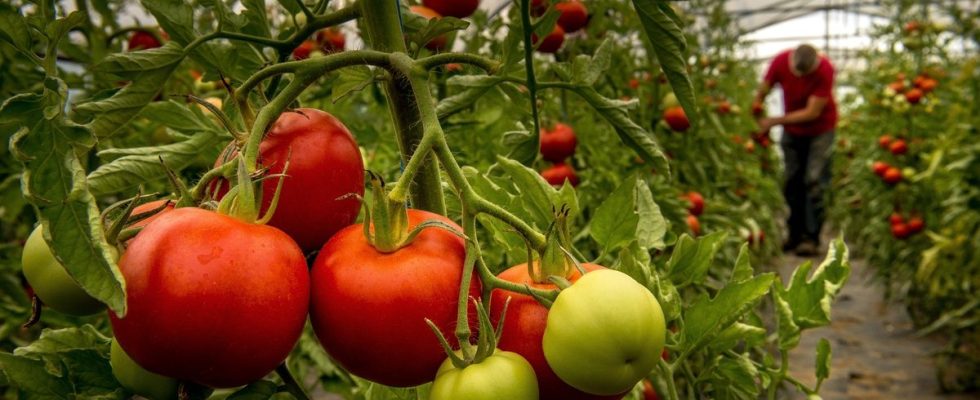“It’s an additional penknife in the contract of trust that binds us with consumers,” laments Philippe Camburet, president fnational federation of organic agriculture (Fnab). The general public will again be able to buy French tomatoes labeled organic out of season, therefore grown in greenhouses heated with fossil gas, under a court decision which saddens some of the producers.
Torn between supporters of greenhouse heating in the name of economic rationality and those of organic farming that respects the cycle of the seasons, France had reached a compromise in 2019 which was repealed on Wednesday by a decision of the Council of State. The highest administrative court has in fact considered that the French authorities were “not competent” to enact new provisions relating to the production and marketing of organic products, already governed by a European regulation.
Imported products rubbed their hands
In 2019, the arbitration found under the aegis of the Minister of Agriculture at the time Didier Guillaume sought to end the battle between historical organic players and producers wishing to accelerate its development. This compromise did not prohibit organic market gardeners from heating their greenhouses, but intended to dissuade them from connecting the heating by prohibiting the sale of summer vegetables (tomatoes, courgettes, peppers, aubergines and cucumbers) with the organic label between December 21 and April 30. “There can be no counter-seasonality in organic. We don’t eat organic products in winter against the season,” Didier Guillaume said at the time.
The problem is that this ban did not apply to imported products. “It was an incomprehensible decision, a betrayal that penalized all our greenhouse producers”, recalled Jean-Michel Delannoy, president of the federation of fruit and vegetable, flower and potato cooperatives (Felcoop) which had seized the Council of State with the federation of vegetable producers, a specialized association of the first agricultural union FNSEA.
According to Jean-Michel Delannoy, the measure gave “freedom” to imports of organic tomatoes “until May 1, it came from Spain, Belgium or the Netherlands”. Moreover, according to him, this restriction has dissuaded “young people” from settling in bio: “Hell is sometimes paved with good intentions. »
In winter, it’s canned or frozen
The Ministry of Agriculture took “note” of the decision of the Council of State on Wednesday evening and the National Institute of Origin and Quality (Inao) announced Thursday that it had deleted the passage on the heating of greenhouses in its “reading guide” to the organic regulations, in accordance with the injunction of the Council of State.
Opposed to the heating of greenhouses, the National Federation of Organic Agriculture (Fnab) was satisfied with the 2019 compromise. Consumers will think “that organic farming is no longer a guarantee of climate preservation”, regrets its president. Philippe Camburet. “The spirit of organic production is to sustainably preserve our natural resources and not to engage in headlong rush to offer everything, all the time,” he continues. For him, the “real logic” is that “if you want to eat tomatoes in winter, it’s canned or frozen, and strawberries are in jam”.
An off-season tomato generates four times more greenhouse gases “than a tomato produced in the good season (between June and September)”, according to the French Agency for Ecological Transition Ademe. Its carbon footprint is considerably increased by the heating of greenhouses, most often with gas. “The problem of greenhouse decarbonization is obvious, it must be tackled head-on”, defends the president of Felcoop, Jean-Michel Delannoy. “We all understood it” in a context of soaring gas prices, “but this cannot be done in five minutes and without means”, he warns. He pleads for the State to devote 25 million euros in aid per year to heat greenhouses differently.

